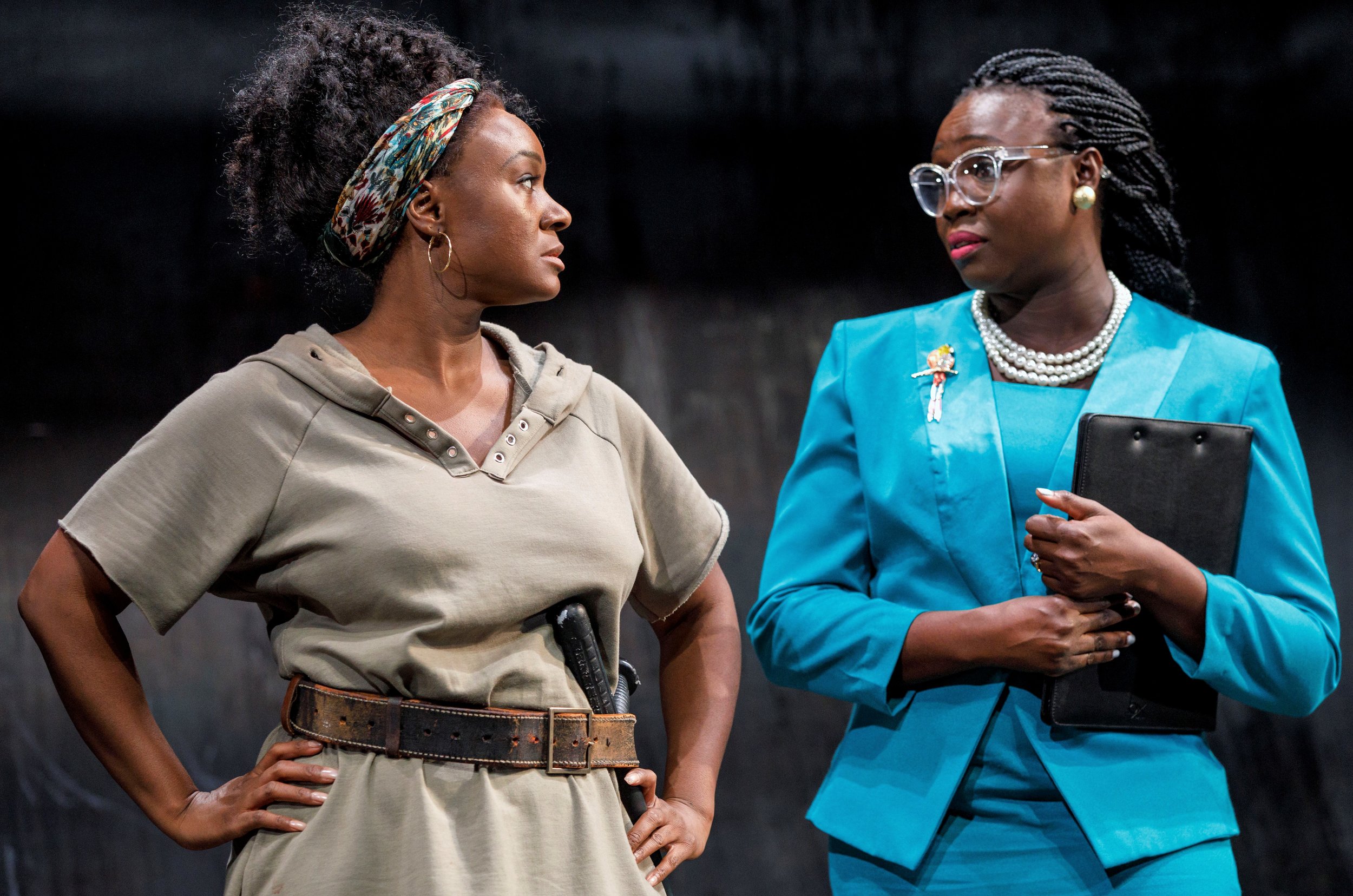When Suzan-Lori Parks decided to write a play based on The Scarlet Letter, she began with the title: Fucking A. Unimpressed, she deleted everything she had and started from scratch, writing the play that would eventually become In the Blood. As Parks tells it, In the Blood had to come out before Fucking A would crystallize; she calls the plays “twins in the womb of my consciousness.” With both in revival at Signature Theatre, audiences have the chance to view Parks’ (fraternal, not identical) twins side by side. The plays are riffs on the theme of our duty to one another, colliding with and speaking to each other in a jazzy feedback loop. If In the Blood ends up the less viable of the pair, it still makes for a fascinating examination of the state the nation from a singular American voice.
Hester (Saycon Sengbloh) gets a checkup from the Doctor (Frank Wood). Top: Sengbloh surrounded by her “five treasures” (from left): Ana Reeder, Russell G. Jones, Wood, Jocelyn Bioh and Michael Braun.
Hester, La Negrita (Saycon Sengbloh) lives under a bridge with her five children from five different men, scrounging a living from whatever they can find. She does her best to instill her “five treasures” (played by Jocelyn Bioh, Michael Braun, Russell G. Jones, Ana Reeder and Frank Wood) with self-respect and skips meals so they can eat. Hester has putative friends like the self-assured prostitute Amiga Gringa (Reeder) and the Welfare Lady (Bioh), who wraps her pink high heels in plastic bags to visit Hester, but it’s clear from the opening tableaux that she is alone. The other cast members stand in shadow hurling insults at her for continuing to have children: Shouldn’t have it if you can’t afford it!” “She don’t got no skills, ’cept one.” “That’s why things are bad like they are ’cause of the girls like that!” Parks’s point is by no means subtle, but neither are the intolerant forces she writes against.
Enjoyment of the play may hinge on one’s ability to accept adults playing young children. The performances are broad parodies of childish behavior, but not in the knowingly ironic manner of shows like You’re a Good Man, Charlie Brown or Sarah Ruhl’s recent For Peter Pan on her 70th birthday. Parks and director Sarah Benson dare the audience to take the actors’ performances seriously because Hester does. Though it’s jarring at first, it quickly becomes joyful to watch the “kids” cavort up and down Lisa Thompson’s sloped, garbage-strewn set. For a while, at least, In the Blood reminds us why plays are called plays. However, the conceit quickly becomes grating, in concert with Hester’s dwindling patience with her children; as her situation becomes more and more hopeless, the children become poisonous reminders of the many people that have used and left her.
Sengbloh with Bioh as Welfare Lady. Photographs by Joan Marcus.
The precariousness of Hester’s situation makes her vulnerable to abuse, but as embodied by Sengbloh, Hester is proud and defiant. Though Hester is certainly no saint, her boundless optimism is her tragic downfall. The single-mindedness with which she pursues any opportunity to “get a leg up” makes her easy prey. Each actor plays an adult in Hester’s life, and each of them, the Doctor (Wood), the Reverend (Jones), the Welfare Lady, Amiga Gringa, and Hester’s first love, Chilli (Braun) gets a confessional monologue to explain directly to the audience how they have taken advantage of Hester, usually for sex.
So how do the two plays fare in conversation? Fucking A mostly works because its targets are amorphous. It touches on racism, misogyny, and the tedium and degradation of poverty, but approaches them indirectly through music and invented language; it employs the tools of theater with spark and ingenuity. In the Blood, for all its creativity, is a primarily cerebral affair. It’s impossible not to care because the story is all too reminiscent of a million others, but with its cartoonish characterizations and blunt metaphors, it forecloses the possibility of empathy and feeling. A Suzan-Lori Parks play is always memorable and never formulaic, but at an intermissionless 110 minutes, In the Blood starts to feel more like homework than performance.
Suzan-Lori Parks’s In the Blood runs through Oct. 15 at Pershing Square Signature Center (480 W. 42nd St.). Evening performances are at 7:30 p.m. Tuesday through Friday, and 8 p.m. on Saturday; matinees are at 2 p.m. Wednesday and Saturday. For tickets and information, call Ticket Central at 212-244-7529 or visit signaturetheatre.org.





